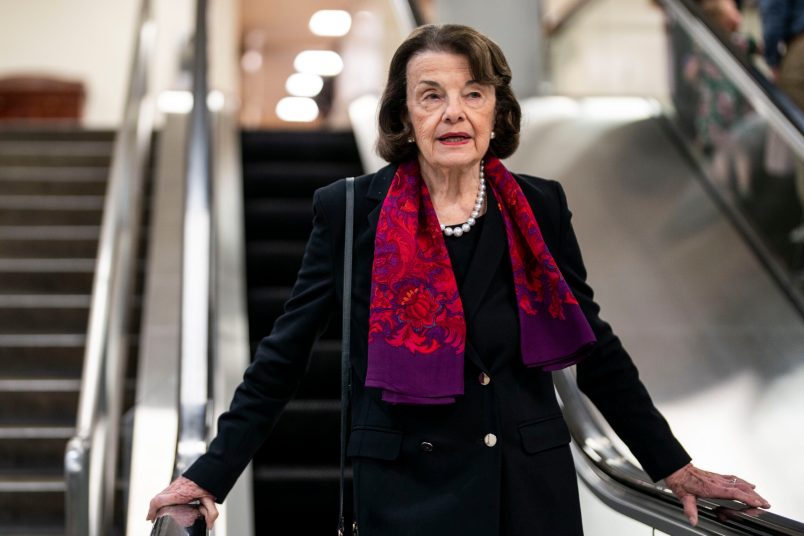Sen. Dianne Feinstein (D-CA) passed away, her office said. She was 90.
Feinstein was the Senate’s longest ever serving woman and the body’s oldest member. First elected in 1992, Feinstein broke new ground throughout her career: She was San Francisco’s first female mayor in 1978 and, after being elected to the Senate, became the first-ever female member of the Judiciary Committee.
She said in 2023 that she would not run for re-election at the end of her current term, which was slated to end in 2024.
Feinstein had faced increasing calls for her immediate resignation in the final years of her life. Her health and mental acuity had visibly deteriorated, and she was forced to spend much of the first months of 2023 away from the Senate due to severe medical issues as the Democrats held a razor-thin majority.
Now, California Gov. Gavin Newsom (D) will appoint a successor. That comes as various California Democrats duke it out in an already-ongoing primary battle for the Democratic nomination to replace Feinstein, a battle which includes Reps. Barbara Lee (D-CA), Katie Porter (D-CA), and Adam Schiff (D-CA).
One of Feinstein’s most significant and enduring accomplishments in the Senate was pushing through the release on a comprehensive report on the CIA’s use of torture under the Bush Administration. The CIA admitted that it spied on Senate Intelligence Committee staffers working on the report.
Feinstein successfully pushed to release the torture report even as CIA officials claimed that it would harm U.S. national security interests, and publicized its contents as various intelligence community figures attempted to downplay the findings. The result was legislation passed in 2015 affirming the country’s ban on torture.
She also devoted much of her legislative career to gun control, a battle which became more difficult and less fruitful as the GOP veered towards the far-right. She played a leading role in passing the 1994 Assault Weapons ban, which stayed in force until 2004.
From then on, Feinstein pushed to reinstate the law with little success as mass shootings became more frequent. Feinstein’s career was defined early on by gun violence. In 1978, Feinstein was first on the scene after the murder of Harvey Milk, then-San Francisco supervisor, where she found his body after a shooting down the hall from her office. The gunman also killed then-mayor George Moscone.
Her battle for some basic limit on access to deadly firearms became harder as the Supreme Court upheld an individual right to bear arms in its 2009 Heller decision.
Feinstein reacted to that ruling with shock.
“I guess I didn’t really think that they would do this,” she said at the time. “I think it opens this nation to a dramatic lack of safety.”
In recent years, Feinstein went out of her way to mark herself as a centrist on a range of issues. She took public stances in recent years against proposals to enact a Green New Deal and calls from the party’s left flank to push for the establishment of a single-payer health care system.
The final years of Feinstein’s career were marked by increasing concerns over her health and advanced age.
In particular, she drew dismay from some Democrats during the confirmation hearings for Justice Amy Coney Barrett. At the close of the hearings, Feinstein gave Sen. Lindsey Graham (R-SC) a big hug, stoking concerns among some that she didn’t take the import of the seat changing hands seriously. That episode also sparked calls for her departure from the panel, and Feinstein ultimately acquiesced. She resigned as senior Democrat on the committee at the end of 2021.
“Senator Feinstein never backed away from a fight for what was just and right,” Feinstein’s Chief of Staff James Sauls said in a statement. “At the same time, she was always willing to work with anyone, even those she disagreed with, if it meant bettering the lives of Californians or the betterment of our nation.



